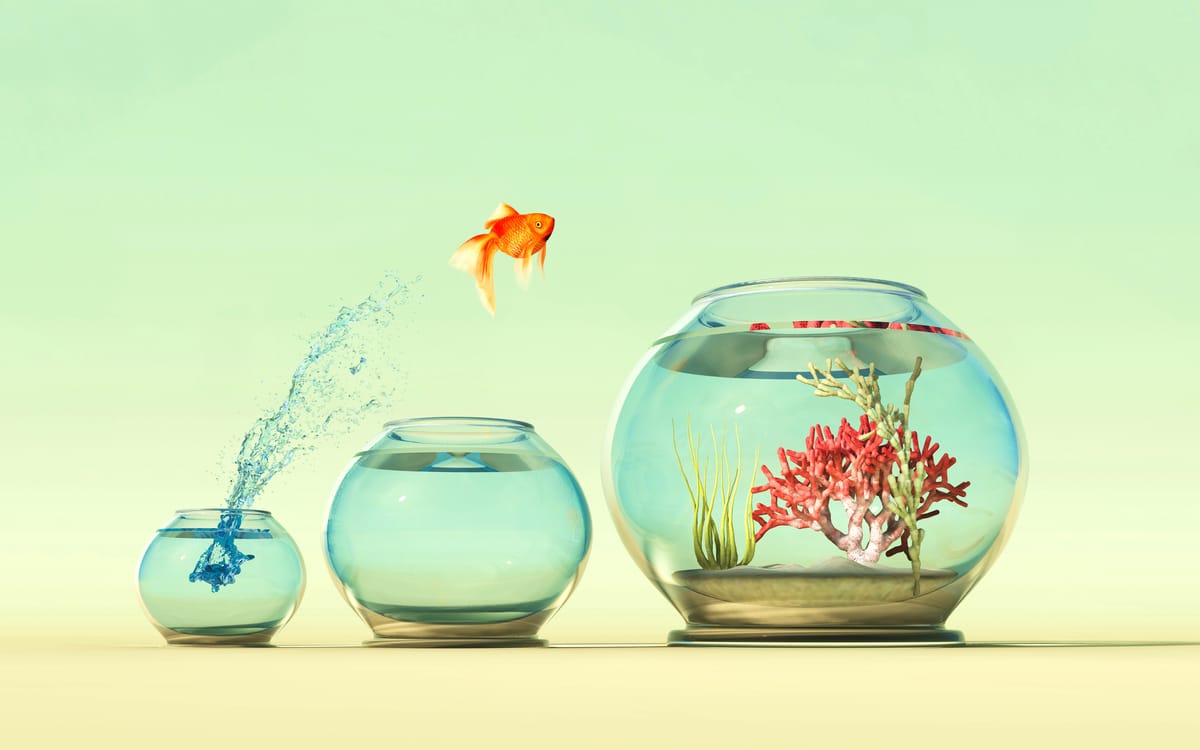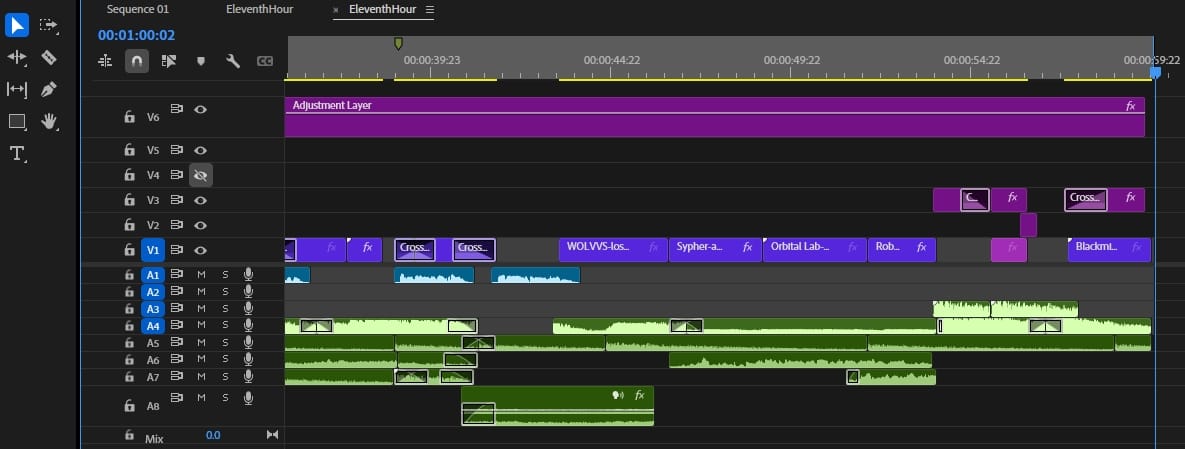From Zero to Submission: How A Tight Deadline Taught Me Video Editing: Part I
From Zero to Submission: How a Tight Deadline Taught Me Video Editing.

I HAD NO IDEA WHAT I WAS DOING
As a software developer and lifelong IT nerd, I can sum up most of my career with five honest words I've mumbled more times than I can count: "No idea what I'm doing."
And yet, somehow… I always manage to get the job done. Wait, what? How is that possible? Great question. Honestly, I'm still figuring it out myself.
To understand this, you first need to grasp the essence of working in tech, a world constantly shifting, evolving, and occasionally breaking itself just for fun. You master one system, and boom! An update pops up and says, "Nice job, now forget everything you knew." It's basically a never-ending game of technological Whack-a-Mole.
Once you have a solid IT foundation, picking up new tools usually becomes easier, unless, of course, it doesn’t. But diving into a completely different field? That’s like asking a goldfish to climb a tree: theoretically possible, but definitely not intuitive.
Take me, for example. I can debug code at 3 a.m. without blinking (much), but ask me to kick a soccer ball or even hang a picture frame, and you'll witness spectacularly calamitous results. So when a friend, a professional video editor, learned about my deep interest in filmmaking and storytelling, she enthusiastically offered to teach me.
Naturally, I did what any self-respecting tech nerd would do, I politely declined. Because nothing says "I’m eager to learn!" like rejecting free expert guidance, right?
Honestly, I wasn’t sure why I turned her down. Maybe I didn’t want to waste her time, or perhaps deep down, I understood something critical about myself: I need an external push. A spark. Usually, that spark comes neatly packaged as a deadline.
Luckily for me, my friend unknowingly provided that exact spark. She casually mentioned her personal project, a submission for FilmSupply’s EditFest, and inadvertently opened a door into a world of filmmaking I hadn't dared explore. Her submission blew me away, and definitely got my vote. You can check it out here.
Around the same time, I’d taken some personal time off to navigate a rough patch. My biggest fan, my wife, quickly jumped on the encouragement train, enthusiastically suggesting, “You should submit something too! What have you got to lose?”
At the time, I didn't answer. I just stared blankly, thinking, “Lose? Probably just sleep, dignity, and sanity, but maybe I could give it a shot!”
A video editing contest, though? I had exactly zero idea what I was doing. My editing experience was limited to awkward workplace slideshows that probably caused more yawns than inspiration.
But my wife's encouraging words stuck, and then my friend sealed the deal: “The contest ends in a week, the 24th. You can still make it.”
Bang. A deadline. My brain immediately released a fresh batch of dopamine, a powerful cocktail mixed with excitement, panic, and a dash of existential dread.
That night, I was neck-deep in YouTube tutorials, editing tips, and inspirational clips. Fueled by curiosity, encouragement, and the adrenaline rush of an impending deadline, my video editing sprint had officially begun.
Most people don’t start learning something by announcing it to the world and setting a deadline.
Well… I did.
Enjoying the journey so far?
If you like deep dives into creative chaos, productivity under pressure, and nerdy lessons from real-life experiments, subscribe to get future posts delivered right to your inbox. Subscribe Now
THE SCIENCE OF LEARNING UNDER PRESSURE
When you have seven days to learn a skill you’ve never touched before, it’s not a walk in the park, more like being pushed off a cliff. Surprisingly, science suggests that might not be such a bad thing.
In Pressure and Neuroplasticity, Dr. Andrew Huberman explains:
“Stress isn’t always bad, it’s the entry point to neuroplasticity when it's controllable and time-limited.”
In other words, short-term stress boosts alertness, motivation, and accelerates learning through dopamine and noradrenaline. That’s exactly what I experienced. Watching every YouTube tutorial wasn’t a relaxed pastime—it was an intense mental sprint. It wasn’t easy. My brain hurt. But it worked.
Despite my motivation and dopamine levels being through the roof, it wasn’t constant high-speed learning. Sometimes, I had to slow down and think carefully, shifting gears from frantic action to deliberate focus, exactly what Daniel Kahneman describes in Thinking, Fast and Slow.
Under pressure, we rely heavily on "System 1", fast, intuitive thinking, but real learning and problem-solving require "System 2", slow, logical, deliberate effort. Kahneman writes:
“System 1 is fast but prone to errors. System 2 is slow but careful.”
When mastering Premiere Pro’s interface or specific editing effects, I consciously activated my System 2 mode. I slowed down, rewatched tutorials, repeated steps, and took notes. Rushing through simply wouldn’t cut it.
WHY DEADLINES FUEL RESULTS
One "superpower" I've relied on throughout my career is sustained focus. So when I read Cal Newport’s Deep Work, it didn’t teach me something entirely new, it clearly explained what I'd instinctively practiced for years.
Newport defines “deep work” as the ability to focus without distraction on cognitively demanding tasks. In today’s world of endless digital distractions, deep work isn’t just valuable, it’s rare.
Deadlines, interestingly, create ideal conditions for deep work. When time is scarce, priorities sharpen. As Newport says:
“Clarity about what matters provides clarity about what does not.”
For me, the submission deadline silenced my usual mental chatter. There was no room for second-guessing or procrastination. The ticking clock muted my inner perfectionist, the one obsessing over minor details.
I set hourly milestones and sprinted relentlessly. Every night: edit, review, move forward. No space for doubt. Even though video editing was entirely new, it felt oddly familiar, like my usual 3 a.m. coding marathons.
Deadlines forced me into hours of focused, undistracted work, little pockets where the outside world disappeared. I wasn’t aiming for perfection, I aimed to finish, to make it real.
If you don't naturally have deadlines, create them. Share them publicly. External pressure transforms casual goals into serious commitments.
Deadlines don’t just push you to finish, they force you to focus.

But there’s a catch:
Perfection gets sacrificed.
My inner perfectionist didn’t stand a chance. With a tight deadline, I wasn’t endlessly tweaking, I was shipping hourly, relentlessly. Mistakes happened, and some might even have cost me my chance of winning.
Would I do it again? Absolutely.
This method has always worked for me. Usually, my results meet expectations, though imperfections remain. Fortunately, in software development and many areas of life, there's often a Version 2.0. But sometimes, contests, business proposals, you only get one shot.
Balancing speed and quality becomes critical. It’s about delivering something you’re proud of, something that reflects your best effort within given constraints.
THE RESULT , AND WHY IT WAS A WIN
Let’s be brutally honest: I’m not proud of my trailer’s quality. The sound editing is rough, some scenes drag, the voice-over needs work, and it probably doesn't clearly convey the story. Yet, despite these flaws, I'm incredibly proud that I finished, learned a new skill, and established a foundation for future projects. It's a complete win-win: pride, learning, and gratitude.
Curious to see what I managed to pull together in just one week? You can watch my EditFest video submission here. Warning: It’s far from perfect, but it’s 100% done.
Lessons Learned
- Always have a plan: Take time to strategize and review your progress.
- Embrace self-doubt, then persist: Every expert was once an amateur.
- Stop chasing perfection: Completing and learning are far more rewarding than flawless execution.
THE REAL TAKEAWAY
When panic inevitably hits, turn it into fuel. Neuroscience and psychology agree: Pressure, when harnessed, accelerates growth. That tight deadline wasn't my enemy, it was my greatest tutor.
The finish line wasn't just about submission, it was about transformation. I didn’t create a masterpiece, but I finished, learned, and emerged stronger. That's the true victory: turning panic into progress and challenges into transformation.
Stay nerdy. Stay bold. Stay kind.
- MindTheNerd.com
👉 Watch my EditFest 2025 video here
It’s far from perfect , but it’s 100% done. My first video edit, completed in just 7 days. Join me on YouTube , where I share my creative and thinking process.
🎞️ And here’s my friend’s EditFest 2025 submission , polished, inspiring, and what sparked this whole journey.
Clean, cinematic, and the one that got my vote.
👉 Watch it here